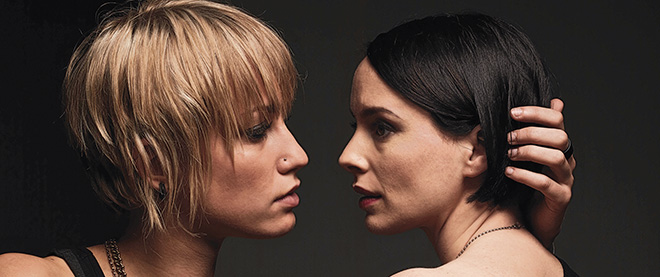Prime-time lesbians are too hot for TV
Emma Teitel explains why not everyone is happy with girl-on-girl-induced ratings
BBC/Kudos
Share

Rumours abound that American singer and occasional actress Jennifer Lopez is leaving the fold of reality television—where she’s been a judge on American Idol for the past two years—to produce and potentially star in a drama on ABC Family. The show, yet to be named (ABC says it’s still in the works), is about a married lesbian couple, their three teenaged children and—apparently—a wayward youth who takes refuge from the streets in their happy home. Needless to say, lesbians in the media are thrilled. ABC Family—or ABC Spark, as it’s called in Canada—may not be breaking new ground in LGBT visibility on the small screen (shows like Pretty Little Liars and The Secret Life of the American Teenager currently feature gay characters), but according to Trish Bendix, an editor for the lesbian pop-culture website AfterEllen.com, JLo’s foray into gay TV has come at a particularly opportune time—one that may mark the death of the “token lesbian.” Bendix notes that lesbians on TV are no longer immediately thereafter “getting pregnant, sleeping with guys, or dying.” “One or all of those things,” she says, “would happen [in the past].”
She has a point. If you’ve ever watched The OC, Grey’s Anatomy, House, or any other TV show seeking a girl-on-girl–induced ratings hike, you’ll have noticed the same trend: Marissa Cooper’s brush with bisexuality on The OC sends her right back into the arms of brooding ex-boyfriend Ryan Atwood (she also dies two seasons later, albeit not from lesbianism), and Grey’s Anatomy’s in-house lesbian, orthopaedic surgeon Callie Torres, has a tendency to sleep with men and even get impregnated by one. But Bendix says more and more shows are emerging with legitimate lesbian characters. And she’s optimistic about the next one: JLo’s ostensible equal-opportunity project.
Whether the larger vested-interest community will feel the same way is another story altogether—especially if Jennifer Lopez actually stars in it. The lesbian media has a history of being elated with news that its community will be represented on the small screen, then grossly disappointed with how it’s represented. Take the handful of lesbian-themed TV shows to spring up in the past 10 years, from Showtime’s The L Word (and subsequent reality spinoff, The Real L Word) to BBC3’s Lip Service, which debuted in 2010. Common criticisms of these shows from lesbian pundits and TV writers often have less to do with acting and character development than with how the characters look. Writers and bloggers are still denouncing The Real L Word as unrealistic and superficial (because, of course, other reality TV shows aren’t) and The Guardian’s Julie Bindel recently bemoaned the fact that on Lip Service, “every single lesbian is skinny, achingly trendy and lashed with lipstick.” Real lesbians, Bindel suggests, “tend not to dress for male approval, often rejecting makeup, high heels and other trappings of femininity.” In other words, real lesbians are homely, and fictional ones are hot.
This is precisely the stereotype Megan Evans has been fighting her entire life. The 25-year-old OC fan and self-avowed “femme” lesbian from London says television shows featuring highly feminine lesbians have made her feel more comfortable with her sexuality. She’s even started an online “Femme Visibility” campaign to raise awareness about femme lesbians. “If you’re girly and into beauty, then you definitely are viewed as not legitimately gay,” she says. “You’re often left wondering, where do I fit in?”
Interestingly enough, The OC made a teenaged Evans feel right at home. “I loved it when Marissa and Alex got together. As they were both girly it was a storyline I could identify with,” she says. Trish Bendix, also a femme, is equally annoyed by the notion that lesbians on TV shouldn’t be so good-looking, especially because almost everyone on TV—gay or straight—is incredibly good-looking. Why would the principle suddenly change for a show about lesbians?
TV was never meant to hold a mirror up to society, unless it was a mirror that provided free airbrushing. And for anyone who objects to cosmetic licence on the tube, Bendix has the perfect solution: “If you really want to see somebody who’s not attractive,” she says, “you can watch Hoarders.”